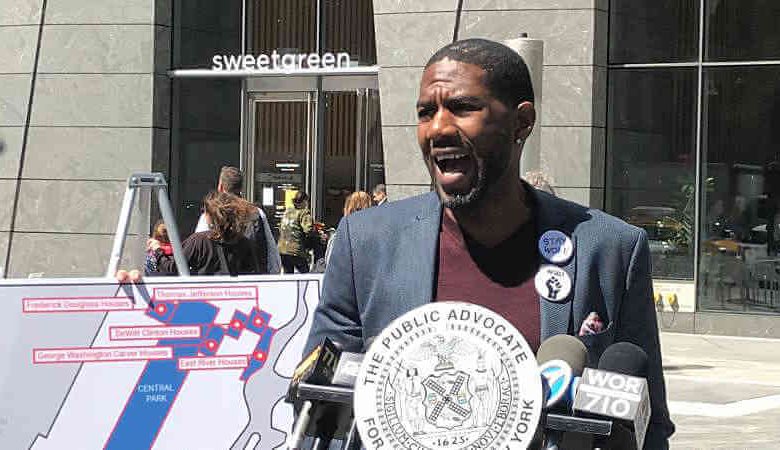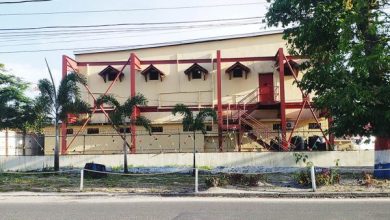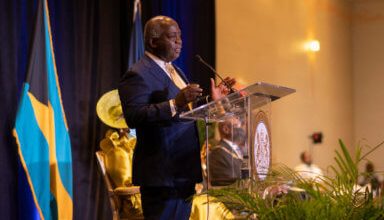Williams pushes legislation to ban solitary confinement in NYC

Public Advocate Jumaane D. Williams, prime sponsor of the landmark legislation to ban solitary confinement in New York City, on Wednesday spoke in support of both his bills and protecting the safety of people on both sides of the bars at the City Council hearing of the Committee on Criminal Justice.
Williams, the son of Grenadian immigrants, also pushed back against what he describes as “misinformation and misconceptions” about the legislation.
The hearing came as the crisis on Rikers Island continues, with 16 incarcerated people losing their lives already this year, including two reported within the last week.
“Solitary confinement is defined by the United Nations as torture; yet, it is still commonly used in jails in New York City,” Williams said. “Intro 549 from the public advocate would finally create a concrete, enforceable ban on solitary in city jails – not just in name but in practice — while also allowing for separation and de-escalation when necessary for safety.
“The bill provides due process and parameters for separation and restrictive housing without enabling the deeply damaging effects of isolation,” he added.
The Public Advocate said solitary confinement is “cruel, it is inhumane, it can ruin people’s lives, and too many do not survive it.
“Many try to mask the practice of isolation with euphemistic names like punitive segregation, but there is no difference–it is solitary confinement,” he said. “Prolonged isolation that looks like, feels like and acts like solitary confinement —i s solitary confinement.
“Physical isolation coupled with the lack of meaningful social interaction causes or exacerbates trauma, as well as other mental health issues,” he added. “Solitary confinement does not only impact the individual; entire communities mourn the losses of their parents, siblings, children, and friends… No one leaves solitary confinement whole.”
Under this legislation, the Department of Corrections (DOC) shall not place an incarcerated individual in a cell, other than at night for sleep, for more than eight hours in any 24-hour period, or during the day for more than two hours in any 24-hour period, unless such confinement is necessary to de-escalate immediate conflict that has caused injury or poses an immediate danger to a person’s safety.
The bill is co-prime sponsored by Council Member Carlina Rivera, and supported by Speaker Adrienne Adams and a veto-proof majority of council members.
Williams said Intro 549 has been “widely misunderstood and mischaracterized.
“To be clear, this bill ends the harmful practices of solitary confinement, but does not ban separation when it is necessary to protect incarcerated individuals and staff,” he said. “If an incident of violence occurs, staff will still be able to immediately separate a person while they begin the process of assigning them to restrictive housing, if necessary.
“While there will be new procedures in place to ensure that we are not isolating individuals, a person who poses a specific and imminent safety risk will not be immediately returned to the general population to await their hearing,” Williams added. “Once again, DOC can separate these individuals prior to their due process hearing, but they can no longer hold people in prolonged isolation. This bill outlines a simple procedure: separate, deescalate, and investigate.”
Prior to his remarks, the public advocate addressed the controversy around the legislation, saying “To the corrections officers, I see you. I know that there is real harm being done to you. And there’s real cause for concern, which is why you are here.
“I have heard of officers who have had heart attacks while on the job, officers who have committed suicide,” Williams said. “I know that female officers who have been sexually assaulted on a regular basis. And while there’s misinformation being sent around about my bill, I know that the harm is real, and I want to make sure I lift that up.
“I think it’s important to remember that on both sides of those bars, most of those folks look like me — primarily Black and Brown people, and they generally come from the same communities,” he continued. “With just a few differences of circumstances, their roles could be reversed.
“It’s important to point out because I know the job is tough, and I know, I don’t work there on a regular basis, and I understand that there has to be accountability,” Williams said. “I want it always, when an officer harms someone who is incarcerated, and when someone incarcerated harms an officer.”
Williams said: “There has to be accountability and a way to keep people safe, but I want to be clear. That cannot be based in torture, and that is all that this bill is saying.
“We have to find a way where we’re producing safety for everyone who’s on that island, an island that is not safe, to be produced,” he said. “But I want you to know that I see you, and I hear you, and I know that the pain is very real.
“I also want to make sure it’s clear that this bill will not solve the problem on Rikers Island,” Williams added. “I want to be clear about that. It is dealing with one particular issue that is also very real, and that is the torture of people that we have to prevent. We have to make sure that we’re humanizing everyone.
“When we dehumanize people, bad things happen,” he continued. “I don’t want to dehumanize our corrections officers. I also don’t want to dehumanize people who are accused of a crime. Our society is going to be based on how much we do or don’t dehumanize people, even people who are accused of committing crimes.





